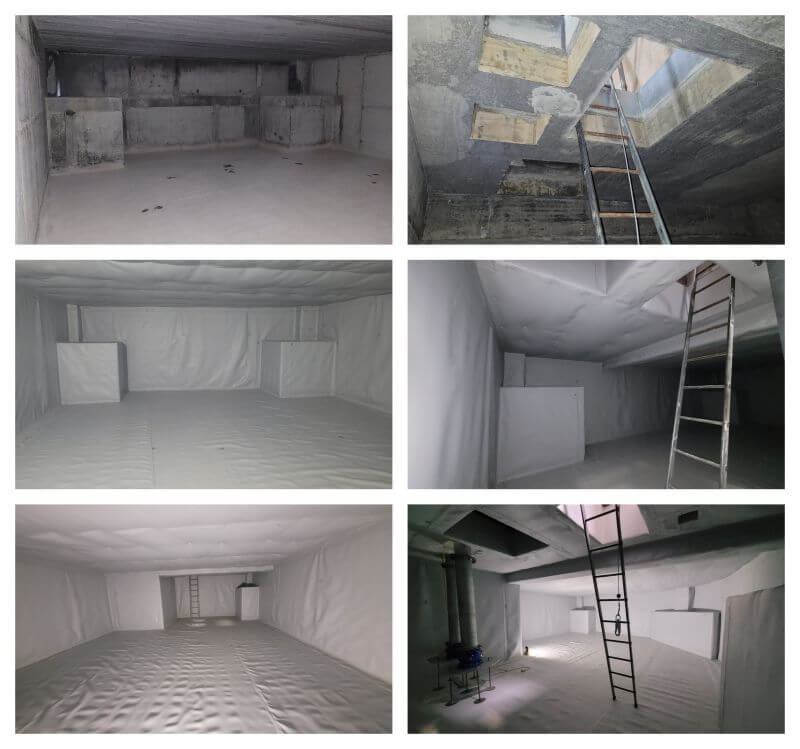Liquid storage containers for industrial use
In the UK, industrial liquid storage containers come in various types depending on the material, capacity, and specific application. Here are some of the common types:
Steel or galvanised corrugated storage tanks
- Russetts Developments Ltd supply galvanized corrugated water tanks in a range of sizes to suit most needs. Along with the water storage tank components we provide a 1.0mm EPDM rubber tank liner fitted with our “Easifit” hanging system to secure the tank liner in place.
- Ideal for storing large quantities of liquids, including water, chemicals, fuels, and oils. These liquid storage containers are typically used in chemical manufacturing, petroleum industries and wastewater management.
Plastic (Polyethylene) tanks
- These tanks are made from high-density polyethylene (HDPE) or other plastics.
- Often used for the storage of water, wastewater, chemicals, and certain hazardous liquids.
- The advantages of plastic tanks is that they are lightweight, corrosion-resistant, and cost-effective.
- Commonly used for rainwater harvesting.
Fiberglass reinforced plastic tanks
- They are well-suited for corrosive liquids like acids, caustics, or brines.
- They offer high durability, corrosion resistance, and flexibility.
- Used for applications such as industrial processes, chemical manufacturing, and wastewater treatment.
Concrete tanks
- These include shaped concrete above and below ground basement tanks. Russetts Developments Ltd offer an onsite tank lining service for complicated shaped tank designs where prefabrication is not an option. Tank liner materials used include Polypropylene, Flagon Soprema synthetic liner of TPO modified Polyolefin and Flagon Soprema PVC.
- Here is an example of a below ground concrete tank lining project involving two concrete tanks. The installation of Flagon PVC liner and protective underlay liner was particularly challenging due to the various shelves and columns protruding from the walls. Additionally, the ceiling and turrets needed to be lined too, to accommodate the high water level.

- Concrete tanks are generally used for long-term storage of water, wastewater, and certain chemicals.
- A durable and robust type of liquid storage solution, particularly suitable for underground storage.
Underground storage tanks
- Often made of steel or fiberglass-reinforced plastic.
- They are large containers typically used for storing liquids or gases below the ground surface. They are designed to prevent leaks, spills, and contamination of the surrounding environment.
- The primary advantage of investing in this type of tank is that they save space and offer environmental protection for hazardous materials.
- Under ground liquid containment tanks are heavily regulated to prevent leaks and environmental contamination.
Intermediate bulk containers
- Generally manufactured from plastic with steel cages.
- Used for transporting and storing liquids in smaller quantities (1000–2000 litres).
- The intermediate bulk containers are stackable, transportable, and reusable.
- Applications include food and beverage industries and pharmaceuticals.
Bunded tanks
- Typically manufactured from steel or plastic and are double-walled.
- Designed to store hazardous liquids like oils, fuels, and chemicals.
- Used as a secondary containment (bund) to prevent spills or leaks from the primary tank.
- Bunded tanks are used for oil storage, hazardous waste management, fuel depots.
Bladder tanks
- Bladder tanks are lined with a flexible material such as a Butyl rubber liner or polymer. Russetts Developments Ltd fabricate 1.5mm WRAS grade Butyl rubber bladders for both horizontal and vertical surge vessels. Butyl rubber bladder tanks can be made to suit your specific requirements and additional reinforced areas can be added to protect vulnerable areas from bursting.
- These tanks are used for the storage of water, fuels, or chemicals in confined spaces.
- Designed for remote or mobile industrial applications, military, oil & gas industries.
These liquid storage containers for industrial use are governed by strict safety and environmental regulations in the UK, especially for hazardous materials storage, and are widely used across various industries like oil and gas, water treatment, chemicals, and food processing.